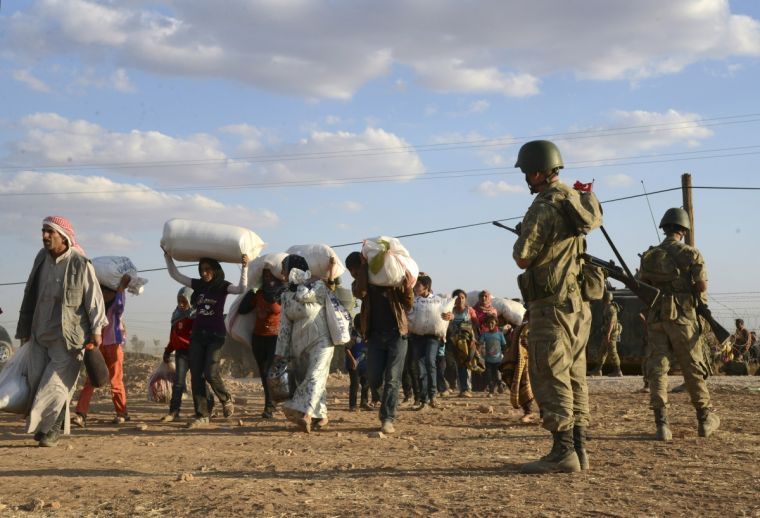130,000 Syrians arrive in Turkey fleeing ISIS

The Kurdish town of Kobani in northern Syria had been a relative safe haven throughout the country's devastating civil war, but ISIS advances caused more than 130,000 Syrian refugees to flee across the border into Turkey over the weekend.
Until now, Kobani, also known as Ayn al-Arab, had been sheltering around 200,000 internally displaced Syrians, but The Times reports that ISIS has now advanced to within six miles of the town. Another 21 surrounding villages have also fallen to the militants since Friday.
Now many of Kobani's inhabitants, together with those who had taken refuge there, have been uprooted again, joining the 3 million others who have left Syria.
Those arriving in Turkey's nearby Sanliurfa province are mainly from Syria's Kurdish minority. The United Nation's refugee agency (UNCHR) said there were large numbers of women, children and older people among the refugees.
Syria's Kurdish fighters, the YPG, have managed to stall the ISIS advance on Kobani, but their spokesman Redur Xelil said "fierce" clashes were still taking place.
Turkey is now host to more than 850,000 Syrian refugees, according to UNHCR, and the government is accelerating the construction of two additional camps to cope with the thousands of new arrivals streaming in every day.
"I commend Turkey's welcoming response to offer refuge and aid to this population so suddenly and violently driven from their homes in fear for their lives," said UN high commissioner for refugees António Guterres.
"This massive influx shows how important it is to offer and preserve asylum space for Syrians as well as the need to mobilise international support to the neighbouring countries so generously hosting them."
However, there were signs that Turkey was struggling to cope with the numbers, as by Monday seven of the nine border posts in the area had been closed.
Historically, the Turks and Kurds have a hostile relationship, having fought on opposing sides in a civil war, and there were clashes between the two along the border on Sunday.
Complicating the picture, the BBC's Mark Lowen says Turkey fears the Kurds may cross into Syria and join the Kurdish militia, strengthening the outlawed PKK (Kurdistan Worker's Party) and possibly launching new attacks on Turkey.
While large numbers continue to flee Syria, the US and Gulf Arab allies pushed ahead with their offensive against the militants on Tuesday with fresh air and missile strikes on Islamic State strongholds in Syria.
Reuters reports that the coalition includes Saudi Arabia, the United Arab Emirates, Jordan, and Bahrain, with Qatar playing a supporting role.
Raqqa, the eastern Syrian city and headquarters of the Islamic State, was among the targets.
US President Barack Obama has so far ruled out troops on the ground, and France, despite attacking IS in northern Iraq last week, has said it will not be expanding its military operation to Syria.
The Guardian reported today that support was growing across Britain's main political parties for British involvement in air strikes against IS and that the British Parliament was due to be recalled on Friday so that MPs could give their approval.
A new Islamic State video has emerged in which it calls members to kill "disbelievers".
"If you can kill a disbelieving American or European – especially the spiteful and filthy French – or an Australian, or a Canadian, or any other disbeliever from the disbelievers waging war, including the citizens of the countries that entered into a coalition against the Islamic State, then rely upon Allah, and kill him in any manner or way however it may be," said the message attributed to IS spokesman Abu Muhammad al-Adnani.
"Do not ask for anyone's advice and do not seek anyone's verdict. Kill the disbeliever whether he is civilian or military, for they have the same ruling. Both of them are disbelievers."
The advance of the Islamic State across Syria has only compounded the misery of Syrians already suffering the devastating effects of more than three years of civil war.
In addition to those who have left Syria, Tearfund reports that there are a further 6.5 million people displaced within the country.
The Christian development agency is supporting Lebanon, another country that has seen a huge influx of Syrian refugees.They are distributing food parcels, shelter, and hygiene items, as well as providing trauma counselling.
Tearfund's prayer resources are available here.











